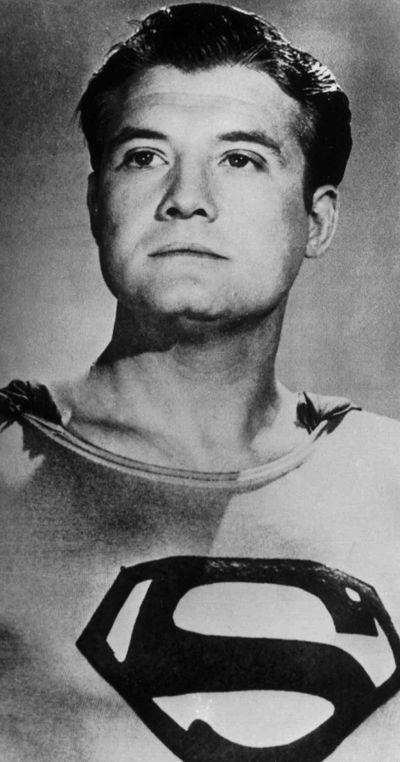What we need is a superhero with staying power

My nomination for American hero of the 20th century is someone who lived half his life in disguise and the other half as the world’s most recognizable man. He appeared on more radio broadcasts than Ellery Queen and in more movies than Marlon Brando, who once played his father.
He helped give America the backbone to wage war against the Nazis, the Depression and the Red Menace. He remains an intimate to kids from Boston to Belgrade and has adult devotees who, like Talmudic scholars, parse his every utterance.
And he has done it all while wearing underpants over a full-body leotard.
This true American hero is an alien from outer space who, once he reached Earth, traded in his foreign-sounding name, Kal-El, for a singularly American handle: Superman. It was on his muscle-bound back that the iconic comic book took flight and that the very idea of the superhero was born. In April, Superman turned 75.
Ah, you say, the Man of Steel – I know him! But do you really? Do you know the wrenching story of his birth and nurturing at the hands of a parade of young creators yearning for their own absent fathers?
The first was the youngest child of Lithuanian immigrants who was devastated when his dad died during a robbery. Although there was no bringing back his father and role model, Jerry Siegel did bring to life a hero able not just to run fast and jump high but, as we see early on, to fend off a robber.
Who would publish this fanciful tale? How about Jack Liebowitz? He was a hard-headed comic book entrepreneur whose own dad died just after he was born and who needed a hero.
While many baby boomers discovered the costumed crusader in the comics, even more got to know him when he hurtled onto their television screens in the 1950s.
Whitney Ellsworth, the man who wrote, edited and produced nearly all of those shows, was just 14 when he lost his 45-year-old father to a heart attack. George Reeves, TV’s original Clark Kent/Superman, didn’t even know who his biological father was until he was in his 20s.
Who better to create the ultimate childhood fantasy figure than men whose childhoods were stolen from them?
Not just Superman but his rivals too were more than they seemed, and more than fantasy. Many were real-world menaces, which made the Superman stories timely and authentic.
Superman stood up to Hitler and Stalin before America did. The Metropolis Marvel used his radio broadcast to expose the savagery of the Ku Klux Klan, and in his comic books, he took on slumlords and wife-beaters.
Lex Luthor, Superman’s most persistent foe, likely came from Siegel’s boyhood. The day after his father died, his hometown newspaper published a letter denouncing the kind of vigilante justice that would become Superman’s early signature. The letter writer: A.L. Luther.
The superhero never revealed how he voted, but during the Depression, he certainly seemed like a New Dealer, hellbent on truth and justice. And during the Reagan Revolution, he was a patriot trumpeting the American way. In between, his sex life underwent an even more drastic about-face as he traded in celibacy for marriage (to his newspaper colleague Lois Lane).
The question fans are asking today, as Superman passes the three-quarter-century mark, is whether this 20th century hero can endure deep into the new century and millennium.
He already has defied the life expectancy for cultural icons and literary properties. His handlers have tried to kill him off before, most dramatically in the 1990s “Death of Superman” series, but the world wouldn’t have it.
Kids still want to be like him, just as their parents did when they were kids. He has proved tougher and more embedded in our DNA than Siegel and his artist sidekick Joe Shuster would have dared to dream.
Whether he lives on depends in part on those telling his story – in the comic books, on TV, in the movies – and whether those efforts continue developing the richness of his character. All signs suggest they will.
It depends too on the steadfastness of his owners. If he thrived in the hands of a couple of Jewish kids from the ghetto, he should flourish backed by the muscle of Time Warner, one of the world’s biggest media cartels, which would be mad to let its billion-dollar franchise languish.
In the end, however, it comes down to us, and whether we remain as besotted by Superman as our parents and grandparents were.
Why wouldn’t we be? Heroes like Doc Savage, Ty Cobb and even Teddy Roosevelt can become dated, interesting reflections of their era but not ours. Others, like Sherlock Holmes, Babe Ruth and Franklin D. Roosevelt, still resonate, tapping into something primal.
I’m betting Superman will endure. Part of it is the irresistible allure of taking flight. Part of it is the seduction of the love triangle and his secret identity. Part of it is the way he can take us back to being 10 years old again.
The more that flesh-and-blood role models let us down, the more we turn to fictional ones who stay true. With them, and especially with Superman, it is about the possibility – of getting the girl, saving the world (or at least Lois and Jimmy) and having it our way.
Our longest-lasting hero will be with us as long as we need a champion, which should be until the end of time.